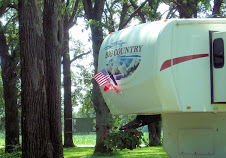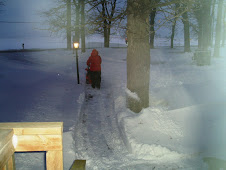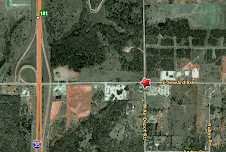Within the city limits, there are 72 historical buildings and homes, enough to give anyone sore eyes from looking for, and at, all of them! I gave up trying! I managed to arrive in Bentonville during the morning rush hour (I really didn't think there would be a 'rush hour' in Bentonville! OOPS!)
Bentonville is the county seat of Benton County, in the far northwest corner of Arkansas. It has grown from a farming community to the home of the world’s largest retailer. Sam Walton started with a small store on the town square andd grew from there but kept the Wal-Mart headquarters in Bentonville. It is now one of the fastest-growing towns in the nation, largely because of Wal-Mart suppliers. Although the town has grown rapidly, the citizens have put forth the effort to preserve and restore homes and buildings.
The first white settlers arrived just a few years before the town was established in 1837. By that time, Osage Indians living in Missouri were no longer hunting in the area. One group of Cherokee on the Trail of Tears, 1837–1838, passed through Bentonville on the way to Indian Territory.
On Dec 31, 1836, John Dickson opened the Osage post office (renamed Bentonville post office on Jan 3, 1843). The county jail was built by 1837, and the first courthouse was in use by May 1838.
The Civil War took an enormous toll on the area. An action at Bentonville preceded the Battle of Pea Ridge, which was fought about 12 miles to the northeast, and troops moved through the town before and after the battle. There was also a skirmish in Bentonville the following year. During the war, most buildings in town, including the courthouse, were burned down by both sides; they destroyed buildings owned by those they suspected of sympathy with the other side, or to prevent the other side from using the buildings.
By the end of the war, about a dozen houses were left standing. It was several years before the town began to recover from the war.
Recovery did not really begin until the 1880s. Many of the commercial buildings and residences built during this time still stand.
In the 1870s and 1880s, tobacco production in Benton County, primarily due to the number of immigrants from Tennessee and Kentucky, was the greatest in the state and tobacco-related businesses were in full operation. Tobacco production declined in the 1890s, falling tobacco prices forced farmers to switch to other crops. Apples were the most successful.
The St. Louis–San Francisco Railway (Frisco) was completed through eastern Benton County in the summer of 1881 but missed Bentonville by 6 miles. The community of Rogers was established along the tracks. In 1883, the Bentonville Railroad Company completed a rail line to Rogers. This track eventually became part of the Arkansas and Oklahoma Railroad chartered in May 1898. By fall, the line extended through Bentonville and west to Gravette, giving passengers, farmers, and merchants the option of using the Kansas City, Pittsburg and Gulf Railroad (Kansas City Southern) or the Frisco. The line was extended to Grove, Oklahoma and ran until 1940. The spur from Rogers to Bentonville is still active.
The rail lines cutting across the region played an important role in the development of the apple industry. Apples, whole and dried, were shipped to larger markets and were processed into vinegar, cider, or brandy. Apple-related businesses in Bentonville in 1903 included a large ice and cold storage plant, 6 evaporators (for drying fruit), and the Macon & Carson Distillery which made applejack (apple brandy).
The African-American population of Bentonville, composed primarily of former slaves and their descendants, were segregated into a portion of north Bentonville known as “The Clique.” By 1888, the Bentonville Colored School offered classes in the Colored Baptist Church through the 8th grade.
Into the 1930s and 1940s, black students who wanted to attend high school had to move to a larger city where there was a high school for African Americans. Others moved away to find work. As a result of this loss of young people, by the late 1940s, the school-age black population had decreased so much that the Bentonville Colored School was closed. At least one student was then sent by bus to the Colored School in Fayetteville, but in the fall of 1955, the Bentonville school system was quietly integrated when one African-American student started the 4th grade.
When the Great Depression came to Bentonville, the town saw a rapid series of business failures. Both Bentonville banks closed on Dec 6, 1930. The town was not without a bank for long. On Feb 28, 1931, the Bank of Bentonville opened.
These depression coincided with disease problems in the apple crop. By the early 1930s, farmers needed 9 sprays to control problems such as San Jose scale, apple scab, codling moth, and Phoma spot. Many of the diseases and pests became immune to the sprays, leaving the farmer no choice but to destroy his orchard. Modern-day Bentonville has no orchards.
As the apple industry weakened, the chicken broiler business became a successful alternative. By 1934, more broilers were raised in Benton County than in any other county in Arkansas. Railroads and other businesses that had led to the success of the fruit industry were adapted for the poultry industry. In Jan 1941, the Peter Fox Company of Chicago leased space in the Bentonville Ice and Cold Storage plant to dress and pack chickens, which were then shipped by rail car to larger markets.
The poultry industry continued to expand during the war years. The Armour Company built a poultry dressing/packing plant in 1943. With the end of the war, companies such as the Kraft Cheese Company, Farm Bureau Poultry Processing, the Bentonville Casting Company, Wendt-Sonis, and Munsingwear Incorporated created jobs that strengthened the town’s post–World War II economy.
Sam Walton bought the Harrison Variety Store on the town square and opened Walton’s 5 and 10 Variety Store on March 18, 1951. Over the next few years, working closely with the Bank of Bentonville, he bought a controlling interest and was elected chairman of the board. In 1969, Wal-Mart Stores Inc. began building a warehouse and general office. Wal-Mart stock went public in 1970 with 300,000 shares for sale at $16.50 each.
NorthWest Arkansas Community College was established in 1989 and has become the second largest community college in the state.
Subscribe to:
Post Comments (Atom)























No comments:
Post a Comment